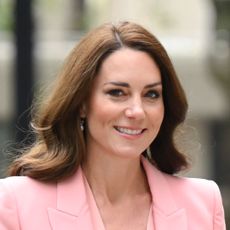Kandahar's Top Cop is a Woman
The Taliban leave death threats on her door at night. But for Malalai Kakar, Kandahar's top cop, fear is not an option.
It is morning in Kandahar, and the streets are full of Taliban. They wear white or black turbans, long beards, and charcoal eyeliner, and drive Toyota pickup trucks, roaring through intersections, narrowly missing street vendors' carts, acting like they own the place-which, in a way, they do. Five years after the Americans forced the Taliban from power, they are reemerging. In fact, they never really surrendered so much as melted away-disappearing into their homes and the hills, waiting for the day when the world would forget about Afghanistan.
On one such street, Malalai Kakar, 40, is getting her six children ready for school: buttoning jackets, tugging T-shirts over heads. While they await their mother's help, Malalai's children take turns tearing pieces from a thin pancake filled with green onions placed on a table in the room where they gather. Older children brush the locks of the younger ones; girls braid each other's hair. Preparations completed, Malalai opens the door and watches her children disappear down the lane toward school. Then she pushes the door shut and locks it.
Alone in the house, Malalai walks quickly to a room in back and grabs an AK-47 that's leaning against a wall. She takes a box of ammunition from the shelf and begins slipping bullets into a banana clip, listening to the click as each cartridge snaps into place. She checks the safety catch and looks at her watch. There's a knock on the door. It is Malalai's brother, who has driven her to work every day for five years now. He is her protection, ensuring that they never take the same route two days in a row. Malalai disappears beneath a powder-blue burka, holding her AK-47, now partially concealed, close to her side. She slips out the door.
Despite her covert actions, Malalai is neither vigilante nor gangster. In Afghanistan, she is something considerably more dangerous: the first woman to attend-and graduate from-the Kandahar Police Academy, and the first to become an investigator with the Kandahar Police Department. Such historic events, which could be lauded as proof of just how far women have come in Afghanistan, are also the reason why Malalai lives in a constant state of siege. Most mornings, before her children wake, she peeks out her front door to look for a "night letter"-a death threat from the Taliban pinned to her home that she doesn't want her children to see. "The notes say things like 'Quit the force, or else,'" she says, with a thin smile. "Of course, I won't."
Inside the Kandahar Police Department, a square, concrete building with tiny windows, Malalai heads for the squad room, where she removes her burka and straightens her uniform. She wears a crisp navy-blue safari shirt with the sleeves rolled up and matching canvas pants gathered in folds around her hips, held up by a thick black belt. Clearly, the Kandahar Police Department never planned on providing a uniform for someone with a 24-inch waist. Against her bone-thin, five-foot frame, the 9-mm pistol strapped to her hip looks comically large.
Kandahar is, hands-down, one of the world's scariest cities. In spite of the U.S. and NATO street patrols, the Taliban seem to be everywhere. "They come out almost every night now," says Malalai. "They're responsible for drive-by shootings, bombings at police posts, and the daily mortaring of a NATO base outside town." Residents are on edge. Foreigners keep to themselves and live behind high walls with armed guards. Police at checkpoints look jumpy, and men with submachine guns wander the hotels. Nearly everyone on the street carries a weapon.
The Afghan landscape still has a desolate, dusty Mad Max quality to it. Everything is a variation on beige. Buildings carry the scars of war-gaping holes from mortar rounds or chips from automatic-weapon fire. Most of Kandahar's windows have been replaced by bricks, as if the occupants simply gave up on replacing the glass. Sitting at the intersection of Pakistan's tribal areas and Afghanistan's burgeoning opium fields, the city harbors drug lords, smugglers, and murderers. Taliban-sponsored suicide bombings are now routine; last December, there were six of them in a nine-day period.
Stay In The Know
Get exclusive access to fashion and beauty trends, hot-off-the-press celebrity news, and more.
Two decades ago, Kandahar was a teeming commercial center-the crossroads through which Pakistani traders passed on their way to Iran and Iraq. Now it is best known as the spiritual birthplace of Islamic fundamentalists who helped drive the Soviets out after a 10-year occupation, only to impose a strict interpretation of sharia (Islamic law) on those who remained. Women in particular suffered. By now, everyone knows the stories-how they were forbidden to work, attend school, or even leave the house without a male family member in tow. And, of course, there were the burkas.
Malalai had been on the police force for seven years when the Taliban came to power. Immediately, the "morality police" targeted her for such flagrant violations of sharia as holding a job. She fled to Pakistan, where she stayed for 10 years. During this time, she met her husband, a U.N. worker and a "modern man," as she calls him. They started a family. Then the Taliban fell, and Malalai returned to Kandahar and the police work she loved.The women of the Kandahar police squad know their gender makes them especially desirable targets for a Taliban suicide bomber or anyone wishing to halt the progress of women. They travel with guards and worry about the safety of their families. "I live in an army compound to try to stay safe," says Malalai. "This isn't an easy job, but it is important that women do it. We need to be a part of the new Afghanistan."
Malalai points out that women's participation in law enforcement is not just about them. It is about the thousands of women in Kandahar who have been denied police assistance time and again, because the Muslim community does not allow men to interact closely with women they aren't related to. Sometimes Malalai will be called to assist a woman who has been badly injured in an accident and needs to be physically helped to a hospital. There have also been times when she and other female officers enter a home first, gathering the women together in one room so the male officers can search for a wanted criminal. Inside the station's squad room, a portrait of Afghanistan's president, Hamid Karzai, hangs in one corner. A pile of pale-blue burkas lies limply in another, thrown in the general direction of a coatrack. Female cops are relaxing around the room.
Kochi, 35, is a heavyset woman who was a housewife and now specializes in airport security; Sadiqua, 28, used to run a beauty parlor and is now an expert in drug investigations; Bibi Ayesha, 20, is a fresh academy graduate with stunning blue eyes; and Zarika, 35, who lives with her husband and daughter in her mother's home, considers illegal-arms seizures her specialty. The women gossip and share cigarettes and tea while they await the day's assignments. The smoking is surreptitious. When a male officer enters the room, they hide the cigarettes under a table and fan away the smoke.
While awaiting their orders, they share stories of life on the force. Sadiqua's police car was fired on two days ago, possibly in connection with two gun smugglers she'd arrested earlier that week. Bibi brought in members of the Taliban after she found dead bodies in their truck. Zarika just received a "night letter" from the Taliban. "Don't work for the government," she says, quoting the letter. "Leave this job and don't go out of the house." The women laugh uneasily.
The squad room is in the back of the building, away from the street and less vulnerable to attack. It looks out onto the parking lot. Police jeeps come and go, lights blazing, leaving contrails of dust in their wake. Without exception, the women in this room are here because of their ringleader, Malalai. For months after the fall of the Taliban, she defiantly went around Kandahar's neighbor-hoods, looking for women to recruit. "Sometimes I lied to get them to come here," Malalai says, lighting another cigarette. "I told them it wasn't so dangerous, or that the money was good. I did what I had to do to sign them up." Usually, her pitch began with her own story of following five brothers and her father, Gul Mohammed Kakar, into law enforcement in 1982. (Her father still works for the police department.) Malalai was only 15 when she entered the academy. "My father said I should get a job and be a cop," she remembers. "It was very matter-of-fact. He never treated me any differently from my brothers." As if to prove her toughness, Malalai pushes up her sleeve and shows off a scar. Her colleagues lean forward to look. "This is where a suspect bit me," she says. "He was running away in the market, and I chased him down. He fell, I grabbed him, and he bit me. I was kicking him to make him let go."
Another time, she was on a stakeout at a suspected Taliban enclave with dozens of male officers. "When the Taliban members arrived on motor-cycles, gunfire broke out," she says. "Most of the officers jumped into their police cars and hightailed it back to the station immediately." Malalai and three male officers were left to fend for themselves. For several hours, they held their own against more than a dozen Taliban. Finally, the Taliban retreated. Back at the station, "I was so mad I told the police who had fled, 'You have long mustaches, but you have no bravery,'" she says, using an Afghan folk expression. "I told them, 'You deserted us.'" The men, according to Malalai, looked shame-faced.
The recruitment of women is a top priority for police forces across the country. "We're thinking of paying them more money than male recruits," says General Syed Noorullah, the director of the Kabul Police Academy. "Right now we pay officers $60 a month. We'd offer women $100 a month to join. But even then, I am not sure it will work." Noorullah also hopes a newly constructed hostel for women, built with money from international donors, will attract recruits. But for now, it's almost deserted.
Perhaps the biggest reason the force needs women is the escalating rate of domestic violence in Afghanistan. There were 47 documented domestic murders in the country in 2005 and 20 in the first half of 2006, according to the Afghan Independent Human Rights Commission. Moreover, they estimate that up to 80 percent of marriages are forced. Almost 60 percent of girls are married before the age of 16, some as young as 6. Incidents of self-immolation (in which a woman who has been physically or emotionally abused sets herself on fire as a means of protest) have risen dramatically since 2003, according to the United Nations Special Rapporteur on Violence Against Women.
As a female police officer, Malalai is able to speak directly to women who are victims of violence. Recently, she started investigating a spate of suspicious murders and cases of abuse involving women in Kandahar. "These are things that I do that men just won't," she says. "I remember this one case, when I knocked on the door but the children would not let me in. From under the cover of my burka, I told them I was their long-lost aunt. They opened the door." Malalai (who says she often wears a burka to disguise her identity) searched the house and found a woman and her son chained by their hands and feet. They'd survived for 10 months on crusts of bread and cups of water. The woman, a widow, was handed over by her in-laws to her brother-in-law after her husband passed away. The brother married her and divorced her, a major taboo that guaranteed she would be a social outcast for the rest of her life. When she went to pick up her belongings, the brother-in-law forced her and her son into a cage and held them captive.
"The Taliban may threaten me," Malalai says. "But because of stories like rescuing this woman, the women and children love me."
Still, mediating marital disputes isn't easy. "The accusations always fly-the husband accuses the wife, the wife accuses the husband," she says. "I talk to the neighbors and family members and try to find a way to bring them to peace. Because divorce isn't acceptable in this country, we have to find another solution. I always try to get the husband to promise that he won't harm his wife."
When Malalai says this, everyone in the room takes a sidelong glance in the direction of a birdlike woman in the corner-Anar Gul, 47, who haunts the women's squad room, pretending to clean. Malalai also found Anar chained in a basement, enslaved by her husband's brother. (Her first husband had died and she was forcibly remarried to his brother, a heroin addict.)
When Malalai got a tip about the abuse, she burst into Anar's house with a nightstick in one hand and a pistol in the other and beat the husband (police brutality, though not uncommon here, rarely comes from female officers). Asked how she subdued a man twice her size, she gives a mock demonstration. "I stomped on him with my boots and punched him," stopping short of using the nightstick. "If I had, I'd have killed him," she says matter-of-factly.
As Malalai tells the story, Anar offers a toothless grin, all gums and cracked lips. She wipes imaginary grit from a table in the squad room and then squats down quietly in the corner. After rescuing her from certain death, Malalai found Anar the cleaning job. Women helping women-it's a small sign of hope in the new Afghanistan. "This case," Malalai says, "had a happy ending."
-
 Kate Middleton Could Become First Princess of Wales in 115 Years to Be Given This Important Royal Role
Kate Middleton Could Become First Princess of Wales in 115 Years to Be Given This Important Royal RoleKing Charles might bestow a huge responsibility on Princess Kate in 2025.
By Amy Mackelden Published
-
 Michelle Obama Honors MLK Day With a Tribute to Martin Luther King Jr. After Skipping Inauguration
Michelle Obama Honors MLK Day With a Tribute to Martin Luther King Jr. After Skipping Inauguration"The time is always right to do what is right."
By Amy Mackelden Published
-
 Kendall Jenner and Hailey Bieber Have Opposite Takes on Après Ski
Kendall Jenner and Hailey Bieber Have Opposite Takes on Après SkiEither way, they're owning Aspen slope style.
By Halie LeSavage Published